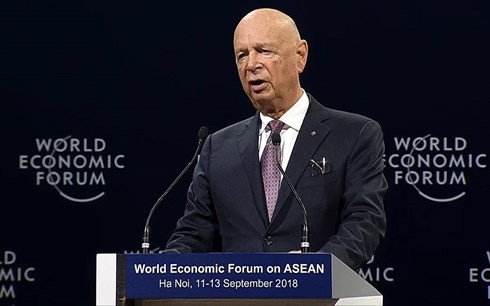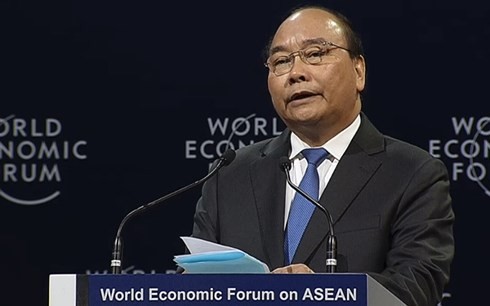(VOVWORLD) - The World Economic Forum on ASEAN (WEF ASEAN) opened in Hanoi on Wednesday with Party leader Nguyen Phu Trong, Prime Minister Nguyen Xuan Phuc and leaders of ASEAN, WEF, and multiple countries in attendance.

WEF Executive Chairman Klaus Schwab addresses the opening of the WEF 2018. (VOV.VN)
|
Founder and Executive Chairman of WEF Klaus Schwab underscored ASEAN’s current status and future in the context of the Fourth Industrial Revolution.
He said the world is facing two challenges. First, it is moving from a mono-polar to multi-polar system, from a unilateral to a multilateral world. Second, the Fourth Industrial Revolution will change global trade, economy, and competitiveness.
Mr. Schwab said the countries which succeed in this revolution will be defined by their entrepreneurs and start-up businesses. The revolution will wipe out some jobs, but offer an opportunity for governments to work more closely with each other.
Executive Chairman of WEF said he believes ASEAN will meet the challenges set by the Fourth Industrial Revolution.
“The world is engaged in a race for the mastership of the 4th Industrial Revolution and global leadership which can partially solve the 4th Industrial Revolution. We want to make sure that ASEAN countries with the right vision, with optimal policies, with young and entrepreneurial population, could be and shall be among the front-runners and not the late comers this revolution. To help, to make ASEAN better prepared and fit for this race is my wish for this meeting,” said Mr. Schwab.

Prime Minister Nguyen Xuan Phuc (VOV.VN)
|
In his opening speech, Prime Minister Nguyen Xuan Phuc highlighted opportunities and challenges ASEAN is facing in the Fourth Industrial Revolution but affirmed that it will create breakthroughs in connecting ASEAN businesses, particularly small and medium-sized enterprises, with the global chain.
Mr. Phuc suggested a number of specific priorities, targeting digital connections and data sharing. He underlined the need to harmonize the business environment, institutions, and law, and find talent and highly skilled technicians.
“In the context of the Industrial Revolution 4.0, many ASEAN countries have set up reform and creativity centers and national incubators. We need to develop a framework to connect national incubators with regional and global ones. We need a strategy for finding talent. To achieve our targets will require strong improvements in education in line with new development trends and continuous career developments. I call for the establishment of an education network and life-long education system in ASEAN countries,” said Prime Minister Phuc.
The Prime Minister said he believes ASEAN will work together for further development, placing people at the center. ASEAN has affirmed its central role in the region amid the spread of the Fourth Industrial Revolution.